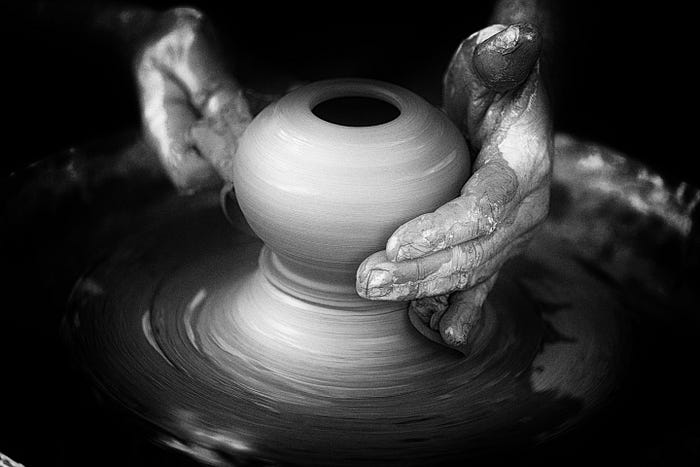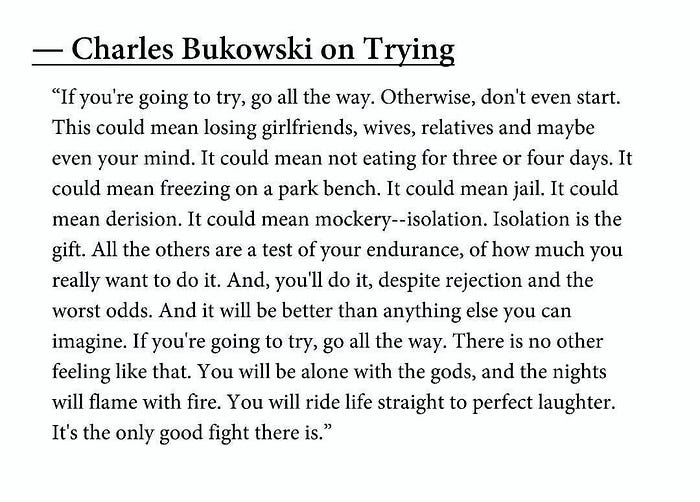Why Quantity Matters So Much More Than Quality
Length: • 4 mins
Annotated by Daryl
This a story of why quantity matters just as much if not more than quality and why failing fast should be the status quo in education.

On Spring of 2016, I learned about an experimental course called 100 Days in the Making offered by NYU ITP professor Katherine Dillon during a lunch-and-learn. She began her presentation by showing us a split photograph where on the left stood a lump of clay and on the right stood dozens of beautifully crafted pots.
Katherine told the story of how a high school teacher once held an experimental pottery class where the class was divided into two groups that would be graded differently. The first group would be graded based on the quality of their best pot while the second group would be graded based on the number of pots created. Katherine then asked us which group we thought would produce the highest quality pot. She took a tally and logically I raised my hand for the quality group — from my entire eighteen years in school, the most important thing I’ve been taught to focus on my whole life was quality and perfection.
Fast forward to the end of the semester, we learned that despite not aiming to produce the perfect pot, the students in the second group had produced far superior pots both in quantity and quality. The first group had been so fixated on creating the perfect pot from the start that by the end of the semester they could only produce a lump of clay at best — these students were handicapped by two things:
- Cripplingly high expectations which lead to the fear of failure and imperfection.
- Believing that there was only one goal to achieve—perfection.
In the first case, those students were so cautious on avoiding imperfections that they did not use one of humanity’s greatest gift — the ability to learn and grow from failure. In the second case, those students had been limited to what was needed to be done and became disinterested in the subject after making what they considered was a “quality” pot.
Those students represent what we see in schools today hardened over decades. Modern education focuses on fixed-curriculum and standardized testing — both of which erodes curiosity, limits creativity, and puts students under immense pressure and stress. We’ve ingrained students with the principles that failure is unacceptable and that you would be setback and “doomed” to repeat a year of your life. This is especially true in college where crippling tuition costs and getting a perfect GPA compel students to fixate solely on passing — often with whatever means necessary, breathing a sigh of relief, and never looking back.
On the other hand by focusing on creating as many pots as possible without fixating on perfection, the students in the second group were no longer handicapped by the fear of failure. Instead they had the freedom to experiment, make mistakes, iterate, and develop their creativity and intuition — a concept so foreign in our education system. In time their confidence also grew. Soon enough, they could produce vastly diverse and sophisticated pots with ease — the trademark signs of a genius.
You may recall the exceptional individuals with world class abilities in Malcolm Gladwell’s Outlier. Gladwell reasons that these individuals had physical characteristics and the DNA predetermined by birth and fortunate circumstances that destined them for greatness — that’s bullshit used to sell books. These people became who they are because of sweat, fearlessness, and world class coaching. You don’t need to be the best to do your best work.
I ask myself — why is it that I enjoy reading and learning so much when I’m not forced to do it. I can be swept for hours reading about obscure television tropes or be captivated by YouTube videos. I can spend hours playing piano, practicing chess, or learning a new language yet despite my curiosity, I wonder why I quickly forget these things. It’s because they are irrelevant to my life. Like the saying goes — use it or lose it. So you can do one of two things: focus on things that are most relevant to you — or even better, make it relevant to you.
To become a genius writer, all you need to do is write everyday, write everything down, learn from the greatest writers, and speak what naturally comes to mind. Don’t let yourself get stuck up on hitting backspace — just write. Just like in sight reading if you make a mistake, you don’t replay the same note, you keep going. Your first attempt will always be terrible and full of mistakes. Accept it.
To become a genius artist, it’s the same recipe. Draw everyday, draw everything you see — especially from your imagination, study the greatest artists. Don’t erase what you have — leave it there and complete it. Reflect on how you can do better and draw it again. Once you’ve accepted that your first draft will always be terrible, you will be free — free from handicaps, free from fear, and free to do anything imaginable.
Do something, something relevant to you, something you love for a hundred days straight. Commit to it, make it count like it was your last days on Earth. Don’t worry about what others think, say, or want. Surround yourself with people who will elevate you. Learn from mistakes, iterate quickly and venture beyond what you’ve already accomplished. Put every ounce of your heart, soul, purpose into it and let the flow carry you — there will be no doubt that you will be a genius.
Every building began with one brick — every book with one word, and every journey with one step. Focus on the journey, not the destination. You never know what will happen. In my mind, quantity — not quality, is what leads to perfection.
With that said, I’ll leave you with quote by Charles Bukowski.
